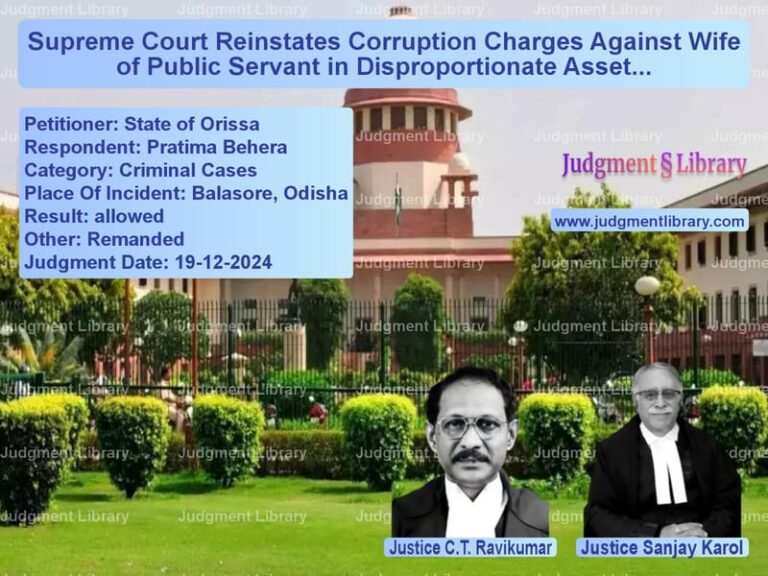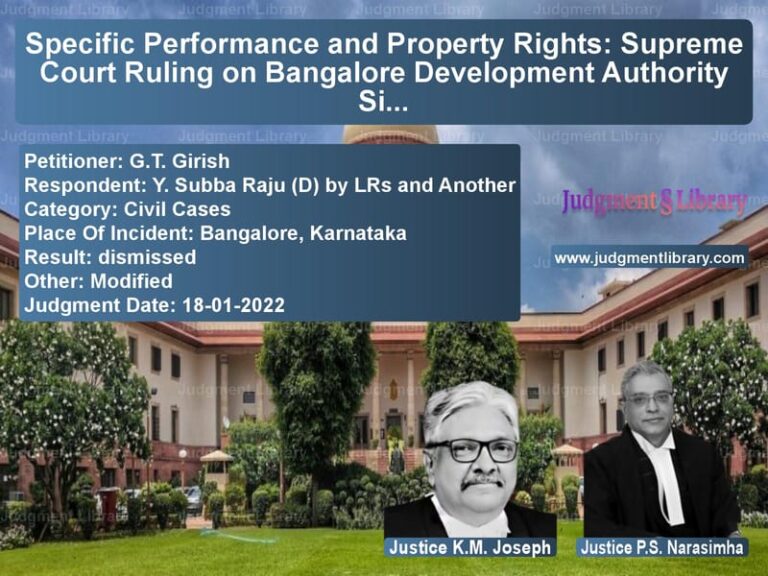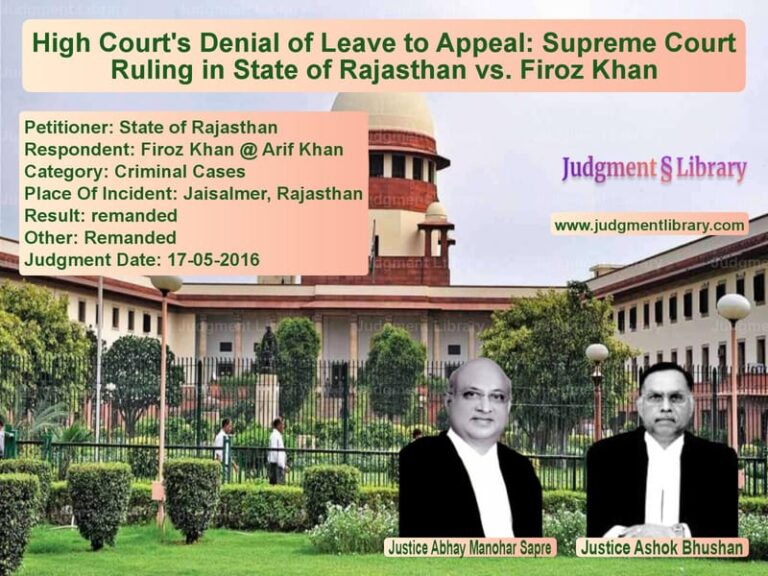Supreme Court Upholds Tribunal’s Decision on ONGC Contract Workers’ Wage Revision
The Supreme Court, in M/S Oil and Natural Gas Corporation Ltd. vs. The President, Oil Field Employees Association & Others, delivered a landmark ruling addressing the employment status and wage revision of contract workers engaged by ONGC. The case revolved around whether contract workers should receive wage revisions equivalent to regular employees and whether a 2016 settlement was binding on all workmen.
Background of the Case
The case stemmed from a dispute between ONGC and contract workers represented by the Oil Field Employees Association. The controversy arose after a 2016 settlement between ONGC and six trade unions, which revised wages and benefits for contract workers under the Fair Wage Policy (FWP). However, the Oil Field Employees Association, formed in 2014, contested the settlement, claiming it was unfair and that their members were entitled to parity with ONGC’s regular employees.
The matter was referred to the Central Government Industrial Tribunal (CGIT), which ruled in favor of the contract workers. ONGC challenged this decision in the Bombay High Court, which upheld the Tribunal’s findings with modifications. Dissatisfied, ONGC appealed to the Supreme Court.
Arguments by the Parties
Petitioner’s Arguments (ONGC)
- The contract workers were not ONGC employees but were engaged through contractors, making the wage revision demand invalid.
- A binding settlement was reached in 2016 with unions representing 77% of contract workers, which should apply to all similar workers.
- The Tribunal erred in directing ONGC to negotiate wage revisions directly with the Oil Field Employees Association.
- The 2016 settlement was valid under Section 18(3)(d) of the Industrial Disputes Act and should be enforced for all contract workers.
Respondent’s Arguments (Oil Field Employees Association)
- Contract workers had been engaged by ONGC for years, performing similar work as regular employees, making them eligible for wage parity.
- The 2016 settlement was not fair and was imposed without consulting all unions, including the Oil Field Employees Association.
- ONGC’s Fair Wage Policy (FWP) required review, as it did not reflect the actual service conditions of contract workers.
- Memoranda of Understanding (MoUs) in 1992, 1995, and 2000 had set wage revision precedents, which ONGC ignored in the 2016 settlement.
Supreme Court’s Key Observations
1. Status of Contract Workers
The Court addressed whether contract workers were legally ONGC employees. It noted:
“The employment relationship must be examined in light of industrial realities. Contractual arrangements cannot be used to deprive workers of legitimate entitlements.”
The Court found that the nature of the work performed by contract workers was integral to ONGC’s operations.
2. Legality of the 2016 Settlement
The Supreme Court examined the 2016 settlement under Section 18(3)(d) of the Industrial Disputes Act. It ruled:
“The settlement was binding only on the unions that were signatories. Workers represented by other unions, including the Oil Field Employees Association, were not bound by its terms.”
The Court held that minority unions had the right to raise disputes if they were not part of a settlement.
3. Wage Parity with Regular Employees
The Tribunal had directed ONGC to enter into a new agreement to ensure fair wages for contract workers. The Supreme Court upheld this direction, noting:
“A fair wage system must reflect industry norms and worker contributions. Wage disparities cannot be justified on contractual technicalities.”
The Court emphasized that contract workers were entitled to just and fair wages, consistent with industry standards.
4. Tribunal’s Jurisdiction and Findings
The Supreme Court rejected ONGC’s argument that the Tribunal had exceeded its jurisdiction:
“The Tribunal’s role is to adjudicate industrial disputes and ensure justice. Its findings were based on evidence and cannot be termed perverse.”
The Court affirmed that the Tribunal had properly exercised its authority in directing wage revisions.
Final Judgment
The Supreme Court ruled as follows:
- ONGC’s appeal was dismissed.
- The Tribunal’s decision directing ONGC to negotiate wage revisions was upheld.
- The 2016 settlement was not binding on all contract workers, and affected workers could seek better terms.
- ONGC was directed to implement wage revisions for contract workers in a fair and transparent manner.
Impact of the Judgment
This ruling has significant implications for labor rights and industrial relations:
- Reaffirms contract workers’ rights: Recognizes that contract workers cannot be denied fair wages.
- Limits employer discretion in wage settlements: Ensures that all unions must be consulted before imposing settlements.
- Strengthens labor dispute resolution: Affirms the role of Industrial Tribunals in ensuring fair employment practices.
- Prevents wage disparities: Directs employers to maintain fair wage structures for all workers.
The Supreme Court’s ruling sets a precedent for ensuring fair labor practices in large public sector enterprises and strengthens the rights of contract workers across industries.
Petitioner Name: M/S Oil and Natural Gas Corporation Ltd..Respondent Name: The President, Oil Field Employees Association & Others.Judgment By: Justice L. Nageswara Rao, Justice Aniruddha Bose.Place Of Incident: Mumbai, Maharashtra.Judgment Date: 04-02-2022.
Don’t miss out on the full details! Download the complete judgment in PDF format below and gain valuable insights instantly!
Download Judgment: ms-oil-and-natural-vs-the-president,-oil-f-supreme-court-of-india-judgment-dated-04-02-2022.pdf
Directly Download Judgment: Directly download this Judgment
See all petitions in Employment Disputes
See all petitions in Public Sector Employees
See all petitions in Recruitment Policies
See all petitions in Judgment by L. Nageswara Rao
See all petitions in Judgment by Aniruddha Bose
See all petitions in dismissed
See all petitions in supreme court of India judgments February 2022
See all petitions in 2022 judgments
See all posts in Service Matters Category
See all allowed petitions in Service Matters Category
See all Dismissed petitions in Service Matters Category
See all partially allowed petitions in Service Matters Category







